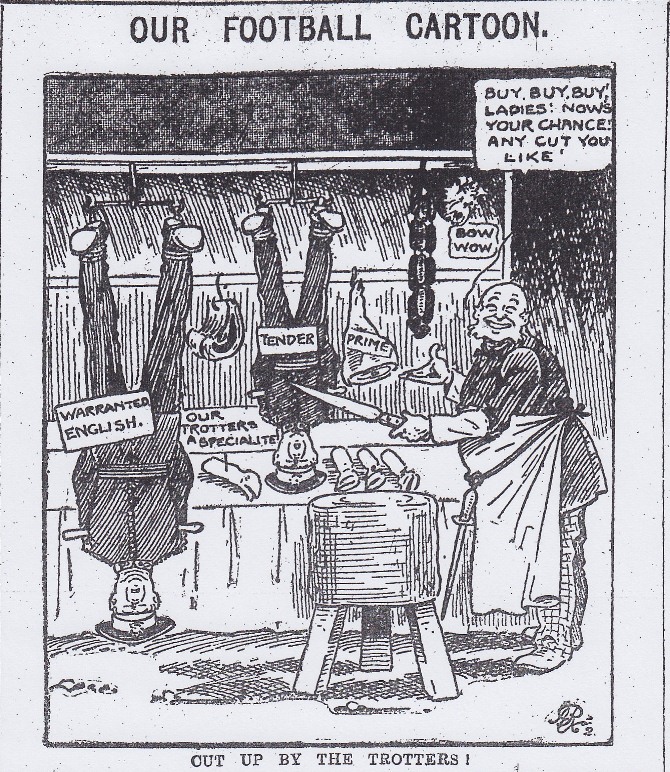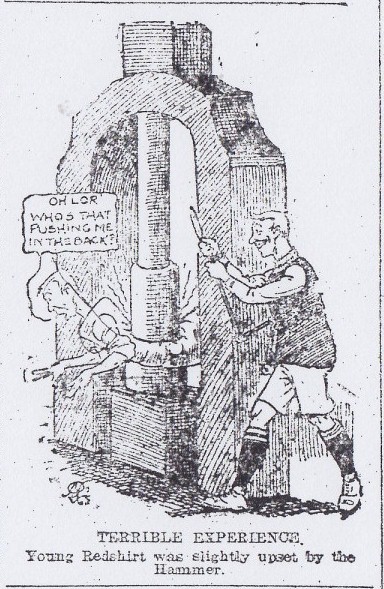By Andy Kelly
Woolwich Arsenal had two games in the week following their 0-3 defeat at Liverpool. Both games were at the Manor Ground against opposition that they had beaten (Bolton) and drawn against (Aston Villa) the previous season, so hopes were high.
First up were Bolton on Saturday 14th September. The Arsenal team lined-up as they had for the opening two games:
Crawford
Shaw Peart
Thomson Sands McKinnon
Greenaway Common McLaughlan Flanagan Winship
Bolton’s team was:
Edmondson
Baverstock Feebury
Greenhalgh Fay Barber
Donaldson Bentley Jones Smith Vizard
13,000 had turned up, putting about £326 into the club’s coffers. If the locals could continue to attend in such numbers then it was likely that the directors would be willing to keep the club in Plumstead.
Woolwich Arsenal completely dominated the first‑half, creating chance after chance and winning numerous corners. McLaughlan was the main offender, wasting a number of chances Bolton’s goalkeeper was also on top form denying Common and Winship. After 26 minutes, Winship hit a scorching shot which Edmondson could only push against the bar, the ball dropping into the goal and bouncing out. The referee allowed the goal following protests from Bolton. Here we go, Arsenal’s luck finally holding out. Shortly after Arsenal’s goal, Smith had a shot from only two yards out that Thomson blocked. Smith sustained an injury from the challenge and had to leave the field. Arsenal continued to have the better of the play but couldn’t make it count. Sands picked up a knock but continued to play before half-time came with Arsenal 1-0 up.
During the half-time interval the Bolton trainer worked his magic sponge on Smith who recovered well enough to start the second half. Woolwich Arsenal resumed how they had finished the first-half, on the attack. Against the run of play, Smith equalised for Bolton. Arsenal continued to attack in search of a winner with Greenaway being denied three times along with Common and McLaughlan. Disaster struck after 65 minutes as Bolton once again scored against the run of play. This second goal hit Arsenal hard as Bolton took control of the game and peppered the home team’s goal with a vast array of shots. McLaughlan managed to hit the post and lose the ball amongst the ball within his legs in the last ten minutes.
The game was one that was dominated by Woolwich Arsenal but they could not convert their chances, losing 1-2.
On the same day, former Woolwich Arsenal hero Andy Ducat broke his leg in a collision with Manchester City’s Lot Jones in the closing stages of the game. With Aston Villa due at the Manor Ground on Monday 16th, the Woolwich Arsenal fans were looking forward to the quick return of Ducat but it was not to be.
So, on Monday Woolwich Arsenal hosted Aston Villa. Another mid-week game was probably not what the directors wanted, especially following a home defeat. McLaughlan was singled out as the scapegoat for the poor display in front of goal against Bolton and was dropped for George Payne to make his Arsenal debut. A strange decision when you consider that Payne had scored once in one reserve game whilst Spittle and Hanks had both scored four times for the reserves. The forward line was also re-shuffled so that Arsenal lined up:
Crawford
Shaw Peart
Thomson Sands McKinnon
Greenaway Flanagan Common Payne Winship
Villa’s team was:
Hardy
Lyons Littlewood
Tranter Morris Harrop
Wallace McLachlan Hampton Stephenson Hall
Harry Hampton is Aston Villa’s all-time highest goalscorer and was the League’s joint top scorer the previous season. Clem Stephenson went on to captain England and was Herbert Chapman’s first signing at Huddersfield, going to play in all of the their successes of the 1920s.
Only 6,805 turned up for the game, bringing in £185.
The first half was dominated by an Aston Villa team that was, without question, a far more superior team. Arsenal had a good spell towards the end of the first half but were impotent in front of goal. Villa went in at half-time 1-0 up from a goal by Stephenson after ten minutes. Arsenal’s best player was captain Percy Sands who broke up a number of Villa attacks and also put Payne in for a sure chance of scoring but he managed to fluff it.
Play was fairly even in the second half until Stephenson put Hampton through after 70 minutes and he converted a shot across the face of the goal. Three minutes later Crawford, pre-dating Manuel Almunia by almost a century, came haring out of his goal only to lose out to Wallace who crossed for Hampton to head into an empty goal. Villa finished the game as 3-0 winners.
Aston Villa would go on to finish second in the First Division this season so being beaten by them wasn’t the end of the world. However, after this game the First Division table looked like this:
|
P |
W |
D |
L |
F |
A |
GA |
Pt |
||
|
1 |
Aston Villa |
5 |
3 |
1 |
1 |
9 |
4 |
2.25 |
7 |
|
2 |
Manchester City |
3 |
3 |
0 |
0 |
3 |
0 |
– |
6 |
|
3 |
Liverpool |
4 |
3 |
0 |
1 |
7 |
3 |
2.33 |
6 |
|
4 |
Sheffield Wednesday |
3 |
3 |
0 |
0 |
9 |
4 |
2.25 |
6 |
|
5 |
Everton |
3 |
2 |
1 |
0 |
6 |
0 |
– |
5 |
|
6 |
Blackburn Rovers |
4 |
2 |
1 |
1 |
12 |
4 |
3.00 |
5 |
|
7 |
Newcastle United |
4 |
2 |
1 |
1 |
5 |
4 |
1.25 |
5 |
|
8 |
Bolton Wanderers |
4 |
2 |
0 |
2 |
5 |
5 |
1.00 |
4 |
|
9 |
Oldham Athletic |
4 |
1 |
2 |
1 |
4 |
5 |
0.80 |
4 |
|
10 |
Derby County |
2 |
1 |
1 |
0 |
3 |
1 |
3.00 |
3 |
|
11 |
West Bromwich Albion |
3 |
1 |
1 |
1 |
4 |
3 |
1.33 |
3 |
|
12 |
Manchester United |
3 |
1 |
1 |
1 |
2 |
2 |
1.00 |
3 |
|
13 |
Bradford City |
2 |
1 |
0 |
1 |
3 |
3 |
1.00 |
2 |
|
14 |
Chelsea |
4 |
1 |
0 |
3 |
5 |
6 |
0.83 |
2 |
|
15 |
Sheffield United |
2 |
0 |
1 |
1 |
3 |
5 |
0.60 |
1 |
|
16 |
Middlesbrough |
3 |
0 |
1 |
2 |
1 |
5 |
0.20 |
1 |
|
17 |
Notts County |
3 |
0 |
1 |
2 |
1 |
6 |
0.17 |
1 |
|
18 |
Sunderland |
3 |
0 |
1 |
2 |
1 |
7 |
0.14 |
1 |
|
19 |
Arsenal |
4 |
0 |
1 |
3 |
1 |
8 |
0.12 |
1 |
|
20 |
Tottenham Hotspur |
3 |
0 |
0 |
3 |
3 |
12 |
0.25 |
0 |
Woolwich Arsenal were above Tottenham but it wasn’t anything to brag about at the time.
Time to worry? On the pitch, probably. Off the pitch, yes as crowds were very poor. A little over 28,000 had watched Woolwich Arsenal’s first three home games. Chelsea and Tottenham had already had crowds bigger than this for one game. The Arsenal directors must have started to seriously consider moving the club following their statement at the AGM regarding the locals not turning up in sufficient numbers.
“An Old Footballer” wrote into the Kentish Independent that he, and about 100 others who had worked overtime at the Royal Arsenal, had to pay full price to get into the Manor Ground at half-time. Previously, fans turning up at half-time only had to pay half price.
The reserves followed up their opening day win with another win on 9th September against Watford. A number of changes were made to forward line:
G.Burdett
E.Penderghast T.Wilkinson
Grant King McEachrane
Lewis Graham E.Hanks Spittle Burrell
Arsenal won 5-3 with Spittle helping himself to four of them and Hanks getting the other. The management were obviously not impressed with the amateurs in defence as none of them played for Arsenal again.
On Saturday 14th September the reserves were away at West Ham and lined-up:
Wilson
Rogers Ford
King Grant Graham
Groves Madge Calder Spittle Burrell
The defence of Oliver Wilson, Rogers and George Ford were all playing their first ever game for Woolwich Arsenal, with Wilson and Ford eventually going on to play for the first team although neither would become regulars. Wilson was yet another player who had played for the financially troubled Leyton the previous season. He only played one Football League game, but it was one that would become significant in Arsenal’s history.
The new defence struggled to play as a unit and the front line, like the first team, were clueless in front of goal. The result being a 0-2 defeat.
The Kentish Independent reported that Gordon Hoare, who had played as an amateur for Woolwich Arsenal for the previous three seasons, was chosen to play for Kent v London on 30th September. This was a strange selection as he was playing for Glossop at the time. Gordon remained an amateur throughout his career, playing for teams local to where he found work as a sculptor. During the summer of 1912 he had won a gold medal at the Stockholm Olympics, scoring two goals in the final as Great Britain beat Denmark 4-2.



Thanks, Andy.
“An Old Footballer” wrote into the Kentish Independent…
interesting note.
What gruesome cartoons!